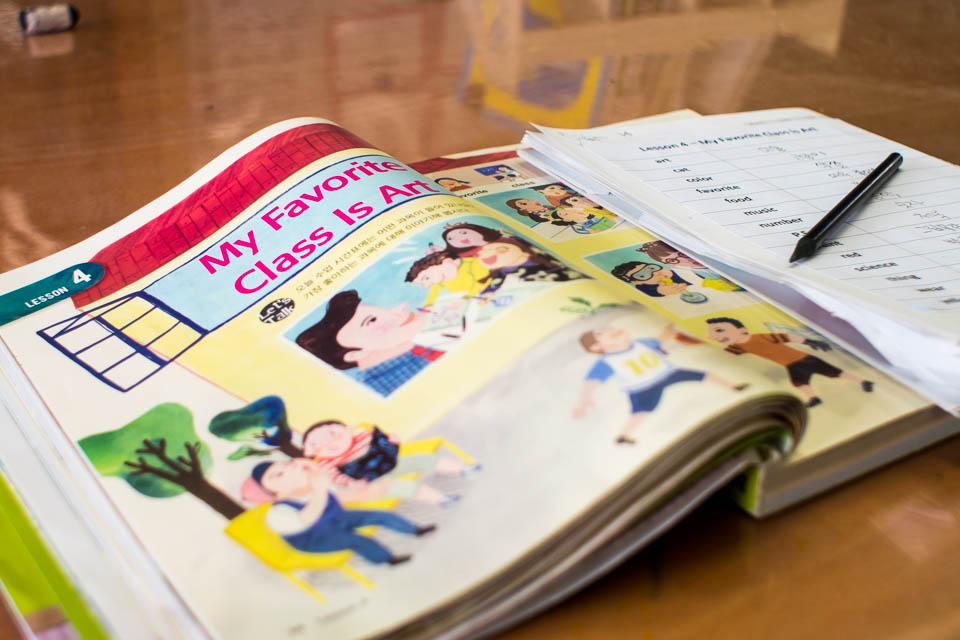Help! I’ve never taught ESL before and I have no idea how I should prepare! Can you give me some recommendations?
Often when trying to obtain a teaching position with a public school program in Korea like EPIK, GEPIK, or GOE, applicants are required to submit a sample lesson plan with their application. Some programs will even request the applicant to do a live demo of their lesson during their interview. A sample lesson plan is exactly how it sounds: a sample of what kind of lesson plan a school can expect from you.
Sample lesson plans should be tailored for the correct type of school as well as grade level. We’ve found that many applicants however are often unable to find information about the levels and abilities of Korean students. This largely results in prospective ESL teachers either using target language that is too high or too low. Therefore we’ve done our best to compile a list of grade-specific target language as well as other recommendations on how applicants can improve their sample lesson plan to catch the eye of employers during job interviews.
So what are characteristics of a good lesson plan? From our experience it’s all about the following three main factors:
What target language does each grade level typically learn?
Assessing students’ levels is a critical component of creating an effective sample lesson plan. Aiming too high can lead to frustration and aiming too low can lead to uninterested students. In this guide we’ll focus primarily on the elementary school age level.
3rd Grade – “Hi! I’m Tom.”
3rd grade is the first grade level in the Korean public school system where English is taught as a subject. Students will learn a variety of simple vocabulary that can be easily visualized. Students will learn words like apple, dog, fish, blue, etc.
When it comes to grammar, students will usually construct sentences made up of no more than 4 words. For example, students may learn to identify themselves with the sentence “I’m Joon”. Students also might be shown a picture and asked to use a sentence to describe the picture. e.g. “It’s a monkey!”
“It’s my mom!”
“It’s my brother!”
“I like apples.”
“I like chicken.”
4th Grade – “What’s for lunch? We have fish.”
4th grade continues to build a basic vocabulary bank as well as practice sentences that really seek to hammer in the question-and-answer dialog scenario.
Students will learn sentences that they can use with other students in the class to create a simple dialog. This makes it possible for the teacher to be able to conduct role-play situations and let students partner up with their classmates. Sentences will still usually target for around 3-5 words each.
“Who is she? She’s a dancer.”
“It’s in the box.”
“It’s under the box.”
“It’s next to the box.”
5th Grade – “This is the kitchen. There is a sink and a table.”
In the 5th grade, students really start to understand and play with the substitution of vocabulary in sentences. Students are taught sentence patterns they can use to express themselves by substituting in other words they learn in the chapter. Students will learn the names of countries, simple numbers (numbers less than 100), as well as the names of different school subjects.
“Where are you from? I’m from Brazil.”
“Where is she from?” She’s from Canada!”
“What’s your favorite subject? My favorite subject is math.”
“What’s your favorite subject? My favorite subject is science.”
“This is the bedroom. There is a bed and a desk.”
“This is the bathroom. There is a sink and a toilet.”
6th Grade – “When is your birthday? My birthday is on June 14th. I will watch a movie. ”
The final year of elementary school holds a variety of different challenges. The formulaic-ness of the previous grades tends to fade away, and students are instead encouraged to experiment with the language. Students are also required to read theme-specific passages and are encouraged to answer questions from the book with more than one sentence.
As far as vocabulary, students will learn the months of the year, how to read and speak large numbers (hundred, thousand, etc), as well as learn ordinal numbers (1st, 2nd, 3rd, etc).
“Who is taller, Joon or Hyun-min? Joon is taller than Hyun-min.”
“Which is country is bigger, Russia or England? Russia is bigger than England.”
“When is Children’s Day? Children’s Day is on June 14th. We will see a movie.”
“When is your birthday? My birthday is on January 8th. I will make a cake.”
“How often do you drink milk? I drink milk twice a day.”
“How often do you exercise? I exercise three times a week.”
OK, I have finalized my target language. What kinds of games or activities should I use?
This is completely dependent on the subject matter as well as the feasibility with a certain class. Don’t expect that by showing students a 5 minute clip from Ghostbusters, that they will automatically absorb some of the language. Instead, think of media as a complimentary tool that can be used to aide in another type of activity. What can you pair the media with to make students learn or retain language?
For example, when showing a video clip from the textbook, maybe cover the screen the first viewing and ask the students to write what sentences or words they hear. Then as the groups to read the sentences they heard. Write the sentences on the board. Then play the video back, this time uncovering the video so that students can see the context. Afterwards tally up the sentences, and see which group got the most correct. This makes a little competition out of a standard listening exercise.
Should I use Powerpoint or go old school?
That’s completely up to you. For the sample lesson plan it might be best to use some sort of powerpoint materials as it’s easy to attach and send to your school or interviewer. Keep in mind though that when you actually head into the classroom that not every classroom may have a big projector or monitor to use. Therefore it’s best not to bank an entire class on using a single powerpoint presentation.
Instead, try to make various sections of the lesson plan use different mediums. For example, you might start off with a single physical prop to gain the students’ interest; then move to the whiteboard; then after that, hand out a worksheet. And then finally end with some sort of game.
If the whole class is forced to stare at a computer monitor for 40 minutes, they will most likely lose interest. Wouldn’t you lose interest too?
What are schools looking for in the sample lesson plan?
Don’t think that schools are going to critique you down to the last detail. In general, school interviewers are looking for a sample lesson plan that is well-prepared, will engage the students, and that has a clear goal. Know what your goal is before you even start creating any of the activities.
A lesson plan that is composed of all games will may make students excited and have fun, but most likely language retainment will suffer. On the contrary, having a lesson plan that is comprised of all study and worksheets will make students lose interest. We encourage applicants and prospective teachers to really think about about how they can create a balanced class where each section serves a function to obtaining a certain goal.
We hope this guide will both inspire you as well as give you a better idea of how to construct a better sample lesson plan as well as get an understanding of what it takes to be an ESL teacher in Korea. If you have any questions or would like to pick the brains of current Korvia teachers, make sure to head over to the official Korvia EPIK or Korvia GEPIK Facebook Group.
*Featured image courtesy of Marwin Arellano






Just what I needed, thank you!
Hi, these are questions than leaving a comment. Are we allowed to find our own housing? I plan on staying in S Korea for quite some time. I have furniture to move so I need a house, 2 car garage and a back yard and more. Also, I am interested in teaching at your Christian School and wanted to know if there is any difference than the others? I want to move in the rural area of S Korea and wondered if I could be directed to a Real Estate Agent?
Yes, you are allowed your own housing because you can get a housing allowance. Please head over to http://www.korvia.com and fill out an online application to use our service. You can do so by clicking the “Apply” button on the top navigation bar. Then please fill out all the information of your current standings so that we can create a file for you in our system and then match you with one of our in-house recruiters.
Please be advised that due the limited amount of recruiters available, we are not able to accept all applicants and do our best to fairly and equally screen and consider each application.
Regards,
Hello! I’m from India and am teaching English for the last fourteen years. I also have a Bachelors degree in Commerce and a Bachelors degree in Education, both from Indian University. Am I an eligible candidate for the epik program?
Hello! I’m from India and I’ve been teaching English for fourteen years. I also have a degree in Bachelors in Commerce and Bachelors in Education. If I do a 120 hours TEFL/TESOL, am I eligible to teach through Epik?
Hi Ruth,
It doesn’t sound like you are eligible, but if you have that many qualifications I would check with people from EPIK anyways. Here are the requirements I found.
Be a citizen of a country where English is the primary language
EPIK teachers must be citizens of one of the following countries: Australia, Canada, Ireland, New Zealand, United Kingdom, United States, or South Africa.
Must have studied from at least the junior high level (7th Grade) and graduated from a university in one of the seven designated countries listed above. South African citizens must provide proof that their schooling in middle school and high school was conducted in English. Letters from the schools will be sufficient proof and must be submitted with the applicant’s initial application.
Ethnic Koreans with legal residency in a country where English is the primary language can apply, but must provide proof of English education beginning from the junior high school level.
Hi Ruth,
Unfortunately, the Korean government requires that those coming to Korea to teach English to be citizens of one of the 7 Native English Speaking countries (USA, Canada, UK, Ireland, South Africa, Australia, or New Zealand). In addition, they are expected to have been educated from the 7th grade through university education level at an educational institution from the 7 Native English Speaking countries. This is not a rule from Korvia Consulting but is a stipulation set forth by the Korean government as well as Immigration office.
How long should the lesson be? Should I plan a 30-minute lesson?
Hi there! I’m from Malaysia. I’ve been educated in English from kindergarten through high school through university. I graduated from The University of Nottingham (UK based) in Malaysia with a Bachelor in English Language and Literature. I’m currently working in a school and I have some experience teaching phonics to nursery children. I’m also giving English lessons to a couple of Korean kids on weekends. Am I eligible to teach through EPIK? Or do I need to take TEFL course to be eligible?
Hello! I am from India. I have teaching license in pedagogical subjects chemistry and English. I also have 2 year Non teaching experience. And as Indian teachers are now allowed to apply for EPIK under CEPA agreement. Will korvia help us to apply for EPIK.
Hi Miya,
Unfortunately, candidates from India will have to apply directly with EPIK instead of working with a recruiting agency.
Please contact EPIK for more info.
Hi!
I am an English teacher from India. I have a Master’s degree in English Literature and a TEFL (120 hr). Am I eligible to apply for the EPIK program under the CEPA agreement and if so, as of 2022, is Korvia helping Indian candidates?
[…] Here are some Example Lesson Plans And Tips. […]